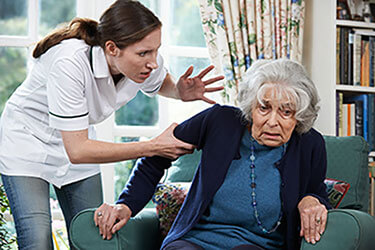
As such, nursing home abuse may be the last thing you’re looking for, and something you would never expect to happen.
Tragically, nursing home abuse is more common than you’d think. In fact, the National Center on Elder Abuse(NCEA) has published data supporting the claim that the prevalence of elder abuse is about 10 percent of the population.
For those with dementia, the prevalence rate skyrockets to about 50 percent.
While it can be difficult to spot abuse, if you get the feeling that something is happening that shouldn’t, and that your loved one is being harmed–either emotionally or physically –you should take action. Consider the following about what constitutes nursing home abuse in Georgia, what you should do when you suspect nursing home abuse, and filing a lawsuit for nursing home abuse in our state.
What Is Nursing Home Abuse?
Nursing home abuse is generally divided into three different categories:
- Physical abuse. Physical abuse is the physical use of force against a nursing home resident. This includes hitting, pinching, kicking, improperly restraining, biting, burning, slapping, tripping, or otherwise harming the resident. It also includes the improper use of medications to subdue or control the resident. Intentionally depriving the resident of food or drink can also constitute physical abuse.
- Sexual abuse. Any unwanted sexual act that occurs between a nursing home resident and nursing home staff member (or another resident) constitutes sexual abuse, even if there is no physical contact made. Examples of sexual abuse may include taking or showing naked photographs, inappropriate sexual touching of a resident, forcing the resident to perform sexual acts, raping the nursing home resident, and more.
- Emotional and psychological abuse. Sometimes, abuse is neither physical or sexual in nature, but instead emotional and psychological. This type of abuse occurs when the resident is threatened or intimidated, bullied, harassed, teased, refused their right to see friends and family, withheld from social activities, and more.
In addition to the three types of abuse listed above, other abusive and inappropriate acts include nursing home neglect and the financial exploitation of a nursing home resident. Financial exploitation is when a nursing home resident is taken advantage of for financial gain, such as convincing a nursing home resident to take out a loan on a staff member’s behalf or stealing from a nursing home resident.
Neglect can be harder to understand, as it often lacks the intent that abuse, or financial exploitation require. Neglect happens when a nursing home resident does not receive the level of care and attention they deserve, perhaps intentionally, but perhaps as a result of under-staffing or another cause. If a nursing home resident is not helped with getting in and out of bed, does not receive proper medical care, suffers a trip and fall, or does not receive adequate nutrition, neglect may be to blame.
What to Do if You Suspect Nursing Home Abuse in Georgia
As the loved one of a nursing home resident, it’s important to watch for the signs of nursing home abuse, including unexplained injuries, bruises, torn or bloodied clothing, emotional changes, withdrawal, suicide attempts, a deterioration in condition, and more.
If you suspect that nursing home abuse is occurring, you should immediately voice your concerns to a nursing home supervisor and request they investigate your complaint. If changes are not made and the issue is not remedied, you should file a complaint with the Georgia Division of Aging Services. A qualified attorney can help you to bring forth your complaint.
If you believe that abuse is occurring that puts your loved one at imminent risk of bodily harm, you should call the police immediately.
What Is a Lawsuit for Nursing Home Abuse?
When nursing home abuse occurs, and that abuse leads to a resident’s harm — as it almost always inevitably will — the nursing home resident or their personal representative maintains the right to file a lawsuit for nursing home abuse. By proving that nursing home abuse occurred and that the abuse was the proximate cause of harm, a plaintiff can seek compensation for the full extent of their economic and non-economic losses.
How Our Nursing Home Abuse Lawyers in Georgia Can Help
Our nursing home abuse lawyers at BBGA are highly skilled in personal injury and nursing home abuse law, and can start working on your claim today. We will help you by:
- Investigating your case and gathering all evidence relevant to your claim, including nursing home staff logs, medical documents, video footage, history of complaints, eyewitness testimony, and more
- Explaining nursing home abuse laws and how to file a personal injury claim, including the damages available
- Ensuring that your claim is brought within the state’s statute of limitations
- Negotiating with an insurance company/nursing home to reach a fair settlement
- Filing a nursing home lawsuit and bringing the case to court to hold the nursing home liable and seek justice
Call Our Nursing Home Abuse Attorneys Today
Nursing home abuse is unacceptable and is something that should never occur. When nursing home staff members abuse patients, our lawyers believe they should face severe civil penalties, if not criminal ones. If you believe that abuse is occurring, or if you are a victim of nursing home abuse yourself, do not hesitate to call our nursing home abuse practice in Georgia for a free consultation and the counsel of skilled lawyers. We work on a contingency fee basis and will never ask you to pay out-of-pocket for our services.

